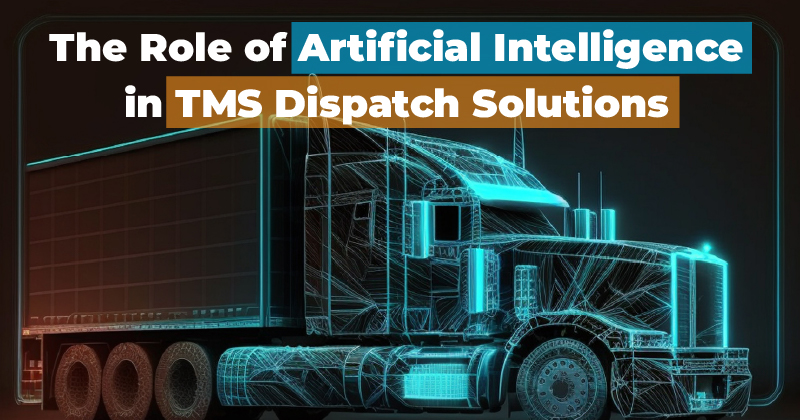
Transportation Management Systems (TMS) are critical for streamlining logistics and ensuring that goods are transported efficiently across supply chains. As the logistics industry becomes more complex, there is a growing need for solutions that can not only manage routine tasks but also enhance decision-making, improve efficiency, and reduce costs. This is where Artificial Intelligence (AI) steps in, revolutionizing how TMS dispatch solutions operate. TMS-Digital, a leading provider of TMS software solutions in the US, understands the impact of AI and has integrated cutting-edge AI technologies to enhance dispatch functionalities. This article explores the role of AI in TMS dispatch solutions and its transformative impact on logistics.
-
What is a TMS Dispatch Solution?
A TMS dispatch solution is a platform that manages the planning, execution, and optimization of the movement of goods. Traditionally, dispatching involved manual route planning, driver assignments, and load matching. These manual processes often resulted in inefficiencies, increased operational costs, and errors. With the introduction of AI, TMS dispatch solutions have evolved to automate and optimize these processes, ensuring seamless dispatch management.
-
How AI Transforms TMS Dispatch Solutions
Artificial Intelligence introduces a suite of capabilities that enable TMS platforms to predict, analyze, and learn from large datasets. By leveraging AI, dispatch systems can now perform tasks that previously required human intervention, but with greater speed and accuracy.
- Predictive Analytics: AI uses historical data and real-time information to predict demand, traffic conditions, and potential disruptions. This allows for proactive route adjustments, helping to minimize delays.
- Automated Decision-Making: AI can automatically assign the best-suited driver to a shipment based on availability, proximity, and skill set, reducing the burden on human dispatchers.
- Load Matching Optimization: With AI, TMS can analyze a range of factors, including freight size, weight, and delivery deadlines, to find the most appropriate match between loads and carriers.
- Real-Time Route Optimization: AI-powered route optimization goes beyond basic GPS functionalities. It considers factors such as weather, traffic congestion, and even fuel efficiency, ensuring that drivers take the best possible route at any given time.
-
The Benefits of AI in TMS Dispatch Solutions
Implementing AI in TMS dispatch systems brings numerous benefits that go beyond just automation. Here are some of the key advantages:
- Increased Operational Efficiency: By automating routine tasks, AI reduces the time spent on manual planning and scheduling. This allows dispatchers to focus on more strategic decision-making activities.
- Reduced Costs: AI helps in minimizing empty miles, optimizing fuel consumption, and reducing unnecessary detours, which directly cuts down transportation costs.
- Enhanced Customer Satisfaction: AI enables more accurate delivery predictions, real-time updates, and proactive communication with customers, resulting in improved service levels.
- Scalability: AI-driven TMS solutions can easily scale to handle an increasing number of shipments without the need for proportional increases in human resources.
-
Key AI Technologies Used in TMS Dispatch Solutions
Several AI technologies are used to enhance the functionalities of TMS dispatch systems. Here’s a look at some of the most impactful ones:
- Machine Learning (ML): Machine learning models can identify patterns in data, such as delivery times and traffic trends, to optimize future dispatch decisions. This ability to learn from data continuously improves the system’s efficiency over time.
- Natural Language Processing (NLP): NLP is used for automating communication between drivers, dispatchers, and customers. AI chatbots can respond to routine queries, freeing up human resources for more complex issues.
- Computer Vision: In TMS, computer vision can be used to assess the condition of vehicles and cargo, ensuring compliance and safety standards are met.
- Robotic Process Automation (RPA): RPA automates repetitive tasks such as data entry, invoice processing, and load assignments, significantly reducing administrative workload.
-
 AI-Powered Route Optimization: A Game Changer
AI-Powered Route Optimization: A Game Changer
AI route optimization uses advanced algorithms to calculate the most efficient routes, considering multiple factors simultaneously. This results in:
- Reduced Fuel Consumption: By avoiding congested routes and optimizing delivery sequences, AI minimizes unnecessary mileage, leading to fuel savings.
- Improved On-Time Deliveries: AI’s ability to predict and react to changing conditions, such as weather and road closures, ensures that deliveries are made on time, enhancing service reliability.
- Minimized Risk of Accidents: AI can recommend safer routes by analyzing historical accident data and real-time road conditions.
-
Overcoming Challenges with AI in TMS Dispatch Solutions
Despite the many benefits, implementing AI in TMS dispatch solutions can present challenges, including:
- Data Quality: AI systems require high-quality, consistent data to function effectively. Poor data can lead to inaccurate predictions and suboptimal decision-making.
- Integration Issues: Integrating AI with existing TMS platforms and legacy systems can be complex and require significant investment.
- Change Management: Transitioning from manual or semi-automated systems to AI-driven dispatching requires employee training and a shift in company culture.
However, companies like TMS-Digital are addressing these challenges by offering comprehensive support, seamless integration, and robust training programs to ensure a smooth transition.
-
AI and the Future of TMS Dispatch Solutions
As AI technology continues to evolve, its role in TMS dispatch solutions will expand. Future advancements may include:
- Autonomous Dispatching: AI could potentially handle entire dispatch operations autonomously, requiring minimal human intervention.
- Predictive Maintenance: AI can analyze vehicle data to predict maintenance needs, reducing downtime and ensuring fleet reliability.
- Advanced Customer Analytics: AI can provide insights into customer preferences and behavior, enabling more personalized service offerings.
Conclusion
At TMS-Digital, we harness the power of AI to transform dispatch management for logistics companies across the United States. Our TMS-Dispatch solution integrates cutting-edge AI technologies to offer features like real-time route optimization, intelligent load matching, and automated dispatching. With TMS-Digital, businesses can achieve higher efficiency, lower costs, and enhanced customer satisfaction.
If you’re looking to elevate your dispatch operations, get in touch with TMS-Digital today and experience the future of logistics firsthand!




